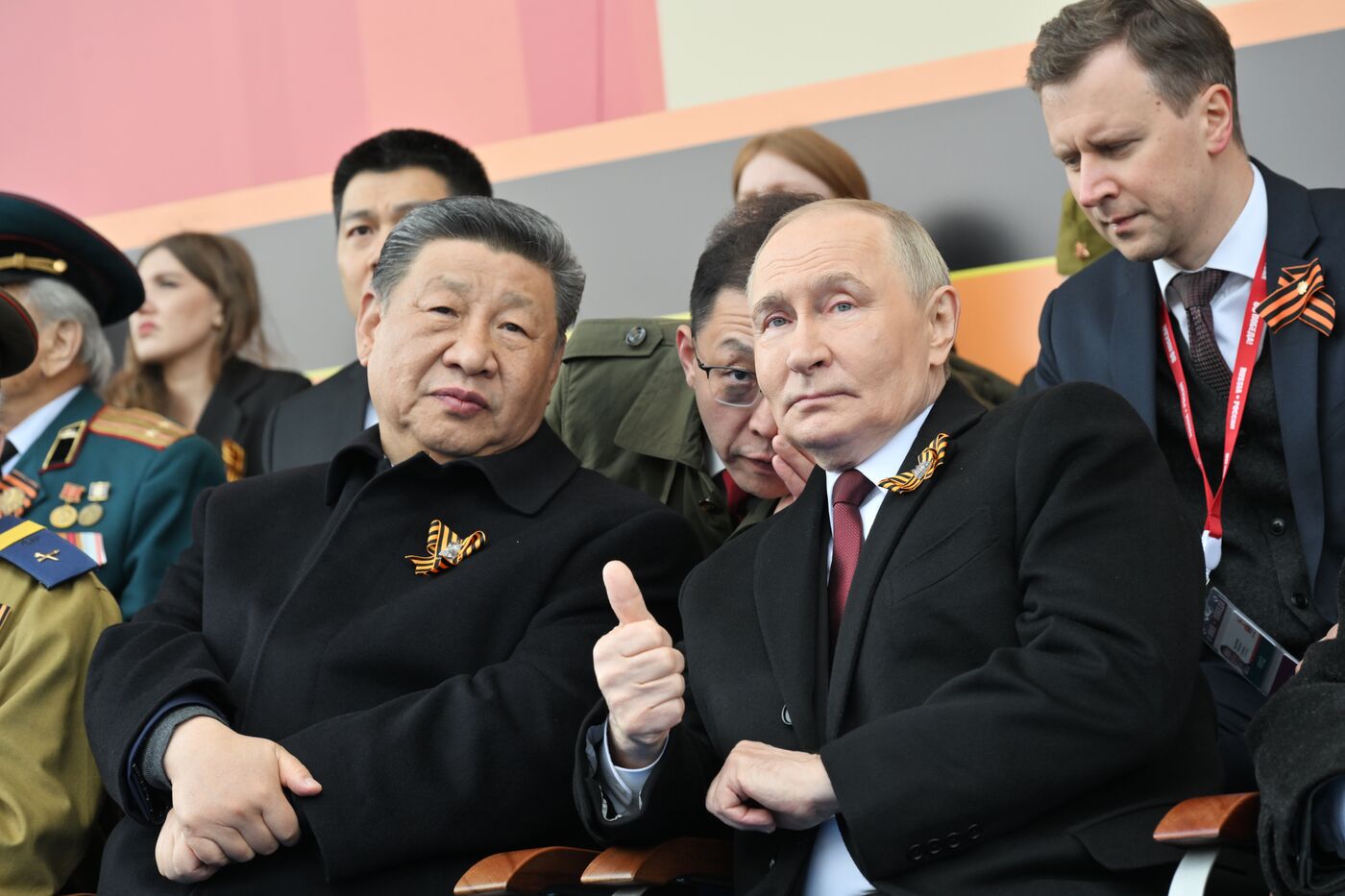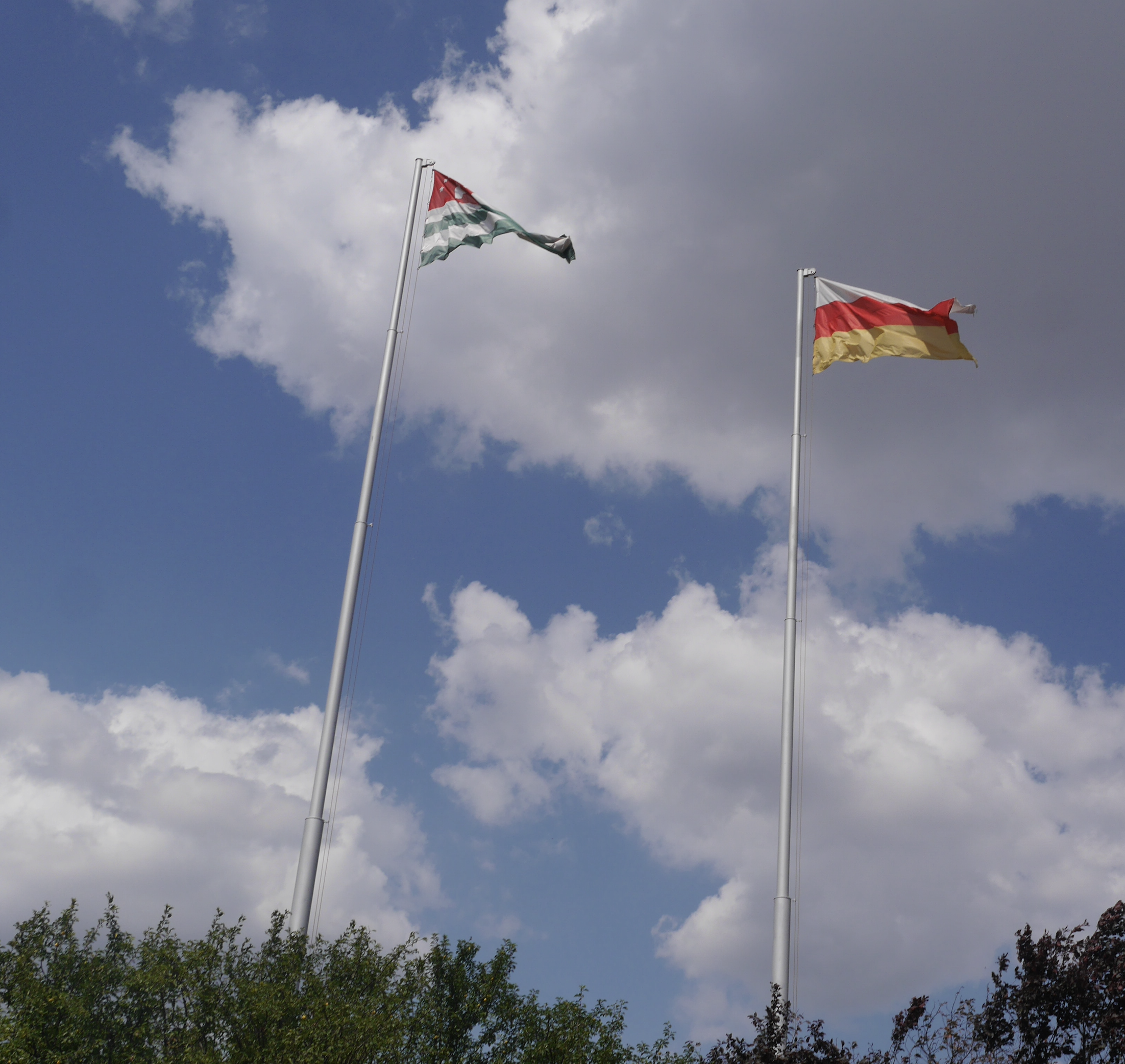
Victory Parade Marks Steady March of China-Russia Relations
Victory Parade Marks Steady March of China-Russia Relations
Executive Summary:
- Russian President Vladimir Putin and People’s Republic of China President Xi Jinping showcased deepened political and military ties during Russia’s May 9 Victory Day celebrations, affirming a shared global vision through strategic declarations on stability and international law.
- Their joint statements emphasized sovereignty, multilateralism, and anti-Western sentiment, aiming to appeal to countries outside the Western bloc while subtly legitimizing controversial activity such as Russia’s war against Ukraine and dismissing Western criticism.
- Both countries continue militarizing space and cyberspace despite calls for arms control and cyber integrity, a strategy that projects moral leadership without scrutiny of their own military ambitions.
Russia’s annual victory pageantry celebrating the end of World War II, known in Russia as the Great Patriotic War, on May 9 heralded more openness in the relationship between Beijing and Moscow and explicitness about the relationship’s global ambitions. Befitting the guest of honor, Chinese Communist Party (CCP) General Secretary Xi Jinping sat next to Russian President Vladimir Putin to view the victory parade and the second-ever appearance of the People’s Liberation Army (PLA) Guard of Honor on Red Square (President of Russia, May 11; People’s Daily, May 11, 2015). Their center-stage appearance capped Xi’s two-day visit that produced a joint statement on strategic stability and a joint declaration on international law designed to reassure the rest of the world that both countries are a force for stability (President of Russia, May 8; People’s Republic of China (PRC) Ministry of Foreign Affairs, May 9).
As Putin and Xi sipped tea together on March 8, they agreed that root causes of the war against Ukraine must be addressed—a tacit acceptance of Putin’s claim of artificial divisions between Russians and Ukrainians that justified the full-scale invasion (President of Russia, July 12, 2021, May 8; see Strategic Snapshot, February 24). The United States, Ukraine, and their allies and partners will find little reassurance, but they are bystanders. Putin and Xi’s intended audience is elsewhere. The CCP and Russian leaders want to demonstrate the strength of their partnership in the face of Western opposition and the existence of an alternative path for countries to choose.
Beijing and Moscow used the two bilateral statements—a Joint Declaration of the People’s Republic of China and the Russian Federation on Further Strengthening Cooperation to Uphold the Authority of International Law (hereafter, Joint Declaration) and a Joint Statement by the People’s Republic of China and the Russian Federation on Global Strategic Stability (hereafter, Joint Statement)—to emphasize their countries’ maintenence and strengthening of global stability and the international order (President of Russia, May 8; PRC Ministry of Foreign Affairs, May 9). The points of emphasis, as shown in the joint press conference, seem deliberately chosen to resonate outside the West with talk of improving global governance, promoting multilateralism and stability, and protecting sovereignty (President of Russia, May 8; PRC Ministry of Foreign Affairs, May 9).
The Joint Declaration updates a similar declaration from 2016 about the importance of international law and multilateral diplomacy, but with a few twists to emphasize new developments (Xinhua, June 6, 2016). Among the new inclusions is an exhortation to not use artificial intelligence to generate disinformation or other propaganda to manipulate foreign populations, even though Beijing and Moscow almost certainly are already doing just that (U.S. Department of Justice, July 9, 2024; Microsoft, April 4; Straits Times, April 8; PRC Ministry of Foreign Affairs, May 9). Despite lauding the war crimes tribunals that followed World War II, the Joint Declaration emphasizes that government officials should have immunity for all actions they take in their official capacity (PRC Ministry of Foreign Affairs, May 9). Such statements suggest a “rules for thee but not for me” attitude that seems to pervade much of Beijing’s diplomacy at the moment and which Moscow sees as beneficial (see China Brief, March 18, April 11).
Another way in which the intended audience is not the United States and its allies is the specific identification of areas for strategic stability that both Beijing and Moscow are actively weaponizing—or at the very least obscuring. In the Joint Statement, for example, the two sides call for strengthening the Biological Weapons Convention and “express concern about the military biological activities of the United States of America and its allies” (PRC Ministry of Foreign Affairs, May 9). This appears to be a reference to the Russian narrative, boosted by the CCP, that the United States operated biological weapons labs located in Ukraine (see China Brief, June 17, 2022). Those labs, however, existed as part of the Biological Threat Reduction Program to secure or neutralize pathogens, in some cases created by the Soviet Union’s biological weapons program (U.S. Defense Department, March 10, 2022; Associated Press, October 25, 2022). PRC researchers also have been actively exploring emerging biological technologies for offensive military use (see China Brief, October 8, 2019).
Similarly, the PRC and Russia also use the Joint Declaration to call for a treaty to prevent an arms race in space and decry any space activities aimed at gaining a military advantage. Both sides also agreed to promote an international initiative for a “political commitment not to be the first to deploy weapons in outer space” (PRC Ministry of Foreign Affairs, May 9). These are claims that sound good to an audience that largely wants to be exempted from the consequences of great power rivalry, so long as they do not interrogate the PRC and Russian positions too closely. For many years, however, Moscow has threatened to weaponize space in order to extract concessions from the United States, invested in space-based electronic warfare, and demonstrated orbital maneuvering near U.S. satellites (see EDM, August 14, 2020, February 20, 2024). People’s Liberation Army writings also have long demonstrated Beijing’s interest in space as a military domain and, after last year’s reorganization, now has a dedicated Military Aerospace Force to unify space-focused capabilities (see China Brief, April 23, 2021, April 26, 2024).
This latest Putin-Xi meeting continued the slow consolidation of the PRC-Russia relationship that has been building for more than 15 years. Xi’s first foreign trip as general secretary was to Moscow, where he also announced a framework for international relations that preceded calls for a community of common destiny or of a shared future now present in these bilateral meetings (President of Russia, March 22, 2013; see China Brief, April 25, 2013). The two have met in Beijing, Moscow, and third countries or talked on the phone at least 13 times since February 2022 (President of Russia, February 25, June 15, September 15, December 30, 2022, March 20, October 18, 2023, February 8, May 16, July 3, October 22, 2024, January 21, February 24, May 8). Even before the two leaders declared the partnership “has no limits, there are no ‘forbidden’ areas of cooperation” ahead of Russia’s full-scale invasion on February 24, 2022, Beijing and Moscow had already signed multiple agreements on sharing propaganda (People’s Daily, October 14, 2014; Sputnik, January 28, 2015; TASS, February 4, 2022). In 2015, the PRC and Russia signed “Agreement between the Government of the Russian Federation and the Government of the People’s Republic of China on cooperation in ensuring international information security,” which led both sides to share technology, intelligence, and internet control methods. Both sides have also jointly promoted cyber sovereignty in multilateral organizations such as the United Nations, Shanghai Cooperation Organization, and BRICS [1] to shape global norms (Cyber Peace, April 30, 2015; War on the Rocks, August 10, 2020; see EDM, November 13, 2024).
In the last two years, the two militaries have conducted numerous joint exercises from the Gulf of Finland and the Persian Gulf to the Bering Sea and the Sea of Japan, giving their collaboration a global flavor (Global Times, July 15, 2023; Al Jazeera, March 12, 2024; South China Morning Post, July 31, 2024; see EDM, November 14, 18, 2024; see China Brief, December 20, 2024). If this meeting suggested anything new, it was that Putin and Xi are simply clearer about the global implications of the Sino-Russian relationship.
Just as their Victory Day pronouncements celebrated the major Soviet and Chinese roles in defeating fascism, last week’s statements emphasized the two states’ roles as “major countries” in championing the defense of the order forged out of World War II (Xinhua, May 7; PRC Ministry of Foreign Affairs, May 8). Yesterday’s fascism has been replaced by power politics, hegemonism, and coercive exploitation of international trade and finance. Multipolarity is here, and so too will justice come—or so Beijing and Moscow want the world to believe.
Note:
[1] BRICS is a loose political-economic grouping originally comprised of Brazil, Russia, India, the People’s Republic of China, and South Africa.


